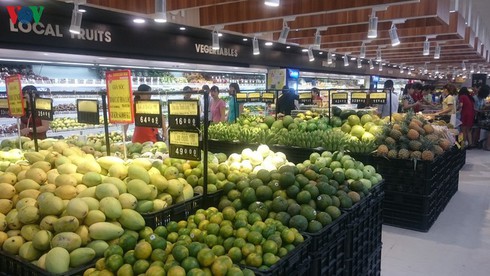with the industry facing the possibility of being "devoured" in the future.
 |
| The Vietnamese retail market is anticipated to face plenty of challenges when the EVFTA enters into force |
A report published by the Nielsen Market Research Company indicates that the country is currently one of the retail markets that is enjoying a high growth rate. Furthermore, the signing of the EVFTA will bring about many favourable conditions for the national economy in general, with the retail market in particular enjoying the benefits.
Representing "fertile" and potential land over recent times, waves of domestic capital and FDI have continued to pour into the Vietnamese retail industry, with foreign retail groups such as Auchan, Family Mart, Lotte, Central Group, Aeon, and Circle K seeking to penetrate and expand into the domestic retail market.
Experts operating within the retail industry regard the EVFTA as an opportunity to boost the circulation of domestic goods through an expansion of the scale and business networks that foreign retailers are able to provide.
The opening of the market will offer Vietnamese retail businesses the chance to enjoy access to a larger market whilst attracting major investment capital and participating in advanced management technology in trade activities with EU nations. In addition, both local firms and consumers will have access to high-quality products and services.
Despite these positives and in parallel with existing opportunities, the race to increase market share between domestic and foreign enterprises within the sector is anticipated to become increasingly fierce in the future.
When the trade deal enters into force in early August the agreement will serve as an "attraction" that will greatly encourage major EU businesses to step up investment in the Vietnamese retail industry.
That represents positive news, although it can be considered a problem due to concerns among many people that the majority of Vietnamese enterprises are small and medium-sized with limited resources, are on a small scale, and have poor levels of competitiveness in terms of being capable of securing a foothold in the retail market.
Vu Vinh Phu, an expert in the retail industry, says that when joining the EVFTA, in addition to providing advantages, local firms will be put under great pressure as an array of different kinds of goods will be exported to other countries, while goods from different nations will enter the Vietnamese market much more freely.
Moreover, goods from other countries hold advantages in terms of being high quality, whilst boasting a higher food safety and hygiene standard. In addition, they follow diversified innovative models and are reasonably priced, meaning Vietnamese goods look set to encounter increasingly tough competition.
Upon offering a frank and objective view of the Vietnamese retail market, Phu believes that at present, the cohesion between local manufacturers and the Vietnamese distribution system remains lax, with only 10% of goods meeting Vietnamese supermarket standards. Many domestic goods are not up to the necessary level of quality, have less diverse designs, are expensive, whilst there is a lack of connectivity between domestic production and distribution chains. These are weaknesses that manufacturers must swiftly address.
The Domestic Market Department under the Ministry of Industry and Trade predicts that the nation’s distribution market will face plenty of challenges and suffer from the initial impact of the opening process as committed.
It is possible that the country’s system of policies and laws will fail to keep up with market fluctuations, there will be a poor capacity to ensure food hygiene and safety standards in the circulation of imported goods on the domestic market, and difficulties could occur in balancing socio-economic development, trade activities, and environmental protection.
Furthermore, there will be fierce competition between domestic distribution companies that have a limited capacity compared to major distribution enterprises from EU nations. Therefore, it is possible that domestic distribution enterprises will be susceptible to being acquired, therefore losing their market share to foreign enterprises.
In order to be able to stand firm on the home turf, Vietnamese manufacturers must strive to improve designs and labour productivity in order to be capable of competing with goods from other countries right within the domestic market.
In addition to receiving support from the State, Vietnamese retail businesses must build their own retail brands, ensure diversified sources of goods going straight from production to retail, and strengthen production and business links in a responsible manner.
Tran Duy Dong, director of the Domestic Market Department, notes, "In order to fully utilise the potential of the EVFTA, it is essential to revamp policies to attract foreign investment, put measures in place to protect domestic enterprises in the direction of establishing technical barriers, strictly controlling the operation of foreign enterprises, not letting foreign enterprises have advantages to access business resources more than domestic ones. It is considered imperative to step up communications regarding regulations under EVFTA commitments.” VOV